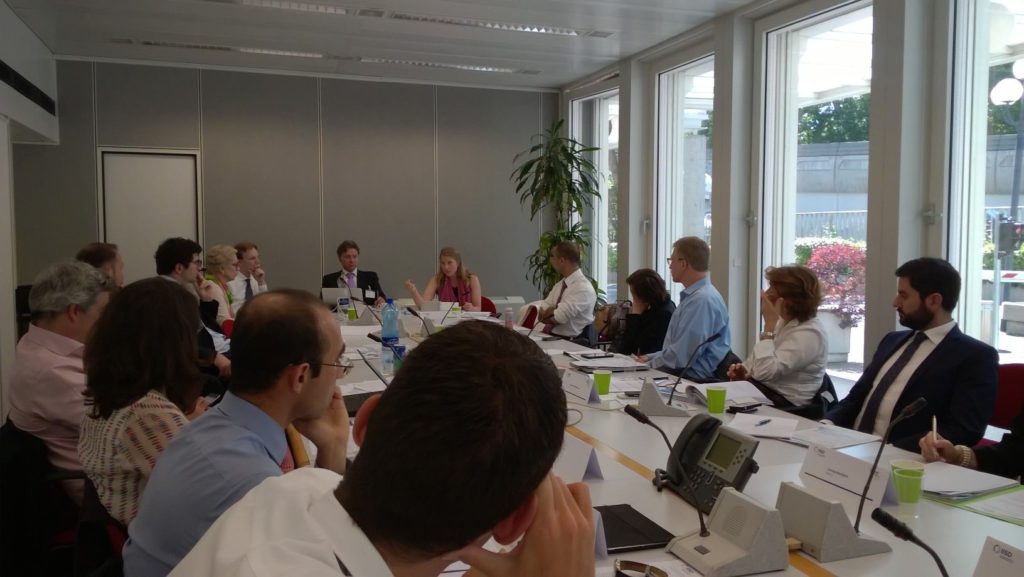EPF-IISD ROUNDTABLE: Driving Sustainable Infrastructure Development and Finance – Building Blocks and Bottlenecks in Emerging Economies
Sustainable Infrastructure

Insufficient infrastructure has been highlighted as a key impediment to sustainable economic development and prosperity in many countries. With the adoption of the 2030 Agenda, the establishment of a Global Infrastructure Forum in Addis Ababa and an Investment and Infrastructure Working Group within the G20, the international community seeks to improve international cooperation on closing the enormous investment and capacity gaps. A particular challenge consists in placing due focus on sustainable infrastructure, i.e. the development and implementation of projects that contribute to economic growth and job creation but simultaneously account for environmental protection, efficient use of resources and low-carbon, climate-resilient operation processes.

Hosted by one of its members, the International Institute for Sustainable Development (IISD), EPF held a working roundtable in Geneva on 6-7 June to review preliminary findings from existing EPF work streams within the Sustainable Infrastructure Policy Initiative that was established during the EPF Beijing Think Week in November 2015. Bringing together around thirty public policy and investment analysts, business representatives from construction and engineering, as well as representatives from international institutions and NGOs, the roundtable focused on how to address four key challenges in sustainable infrastructure development globally and in emerging economies particularly:
(1) The need for governments to articulate long-term sustainable infrastructure policy frameworks and their integration into the national development and climate plans;
(2) The need for international development finance institutions to find effective ways to support national governments and local project developers in developing the necessary capacities to build up a sustainable infrastructure projects pipeline;
(3) The need for the harmonization of an abundance of existing sustainability criteria and standards for the purposes of different stakeholders (i.e. project developers vs. investors);
(4) The need for sustainable financing models, the development of viable business cases and consequently the early involvement of investors in risk calculations and sustainability considerations.
The discussions in Geneva among representatives from ten emerging and industrialized economies as well as international institutions reflected a general awareness that unless the political economy of coal in many countries and the international mindset regarding carbon prizing and reducing fossil fuel subsidies changes, the danger is that new a majority of investments and infrastructure projects will continue to reinforce traditional carbon-intensive economic lock-ins, ultimately jeopardizing any development and climate goals and with it the welfare of future generations.
The first analyses and findings of the existing EPF work streams in this initiative will be published by the end of 2016 and presented to national decision makers as well as on international policy and investment for a like the G20. The EPF invites interested stakeholders from all sectors to join the initiatives and contribute with their expertise, specific tools and outreach as efforts in this field will continue into 2017 and beyond.
Agenda & Participants
Agenda – EPF-IISD Roundtable 2016
Participants – List of Biographies
Roundtable Material
Session 2 – Poster – Infrastructure Indicators to Assess Progress toward Sustainability
Session 3 – Poster – Translating Sustainability Standards and Guidelines into Business Practice
Session 3 – Presentation – Translating Sustainability Standards and Guidelines into Business Practice
Session 3 – Concept note – Translating Sustainability Standards and Guidelines into Business Practice
Session 4 – Jordan-Tank – Presentation – The Green Finance Challenge and Response provided by EBRD’s Infrastructure Project Preparation Facility
Session 4 – Oliveira – Presentation – Challenges in financing sustainable energy in Brazil
Session 4 – Soni – Presentation – Renewable Energy and Multilateral Development Banks: India Case-Study
Session 4 – Zhu – Presentation – Enhancing the Role of NDBs/MDBs in Sustainable Infrastructure Development: China Case Study
Session 5 – Deuchert/de Groen – Presentation – Improving the investor base in Local Currency bond Markets of China, India and Indonesia
Session 5 – Fernandez – Illustration – Business Cycle of Sustainable Infrastructure Projects
Background Documents
First Working Papers
Renewable Energy and Multilateral Development Banks_Indian Case Study



